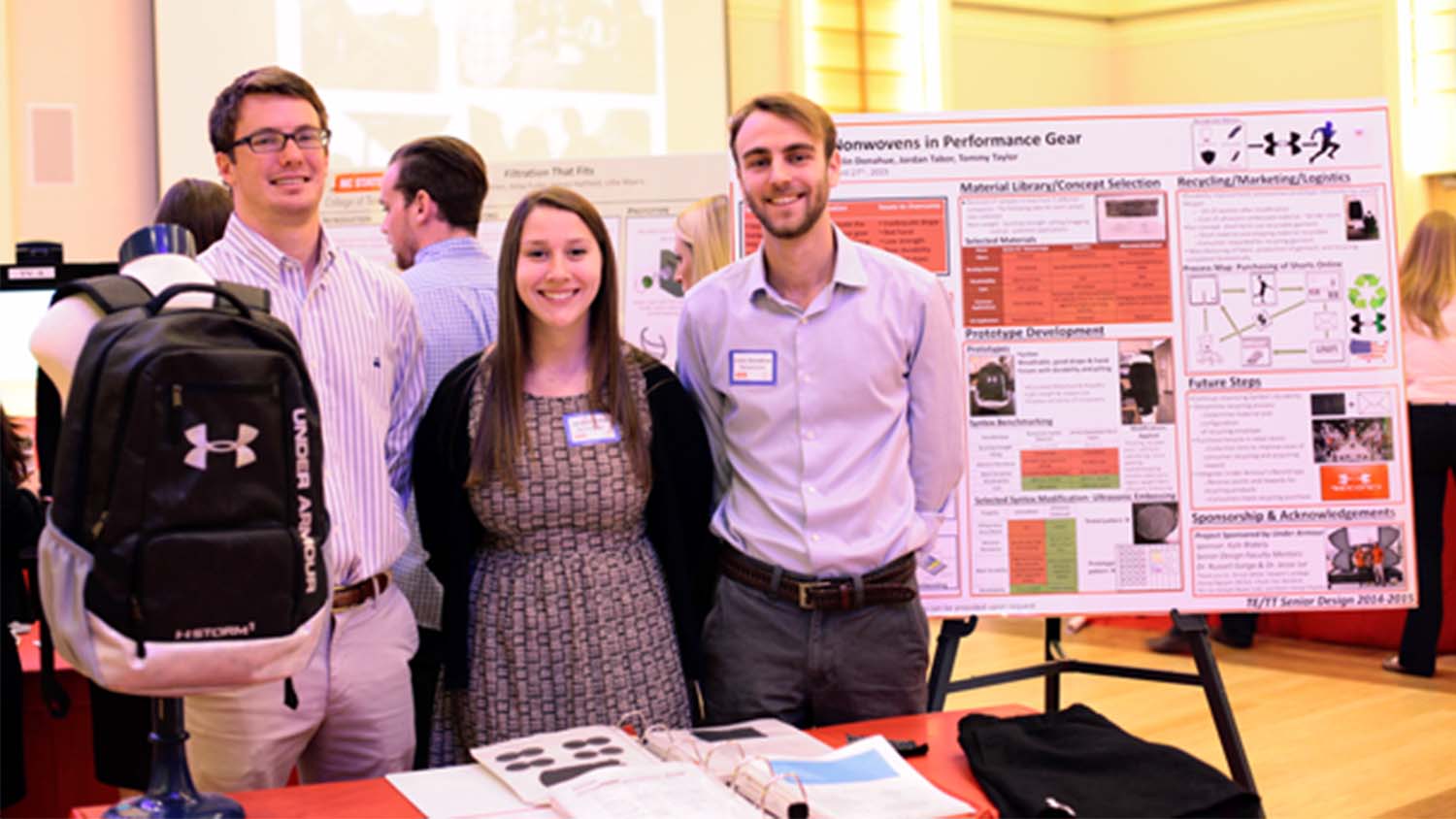Senior Design Day Winners Tackle a Non-Traditional Use for Nonwovens

The Senior Design program for the Textile Engineering and Textile Technology programs at NC State University is designed to allow students to solve an industry relevant, open-ended problem that serves as a culmination of their skill set development in their respective degrees. For Wilson College of Textiles Senior Design team members Colin Donahue, Jordan Tabor and Tommy Taylor the challenge was this: determine where nonwoven fabrics would best be applied to project sponsor Under Armour’s products. Their response earned them first place honors for technical merit in design at the 2015 NC State Design Day competition.
While nonwovens are a cost-effective textile-formation method, historically they have not been considered for performance gear due to concerns with durability and drape. But as technology continues to evolve, Under Armour indicated it like to be on the forefront of new advances in nonwoven formation that not only address durability and drape, but performance factors that aren’t necessarily achieved via conventional textile-formation processes. The company also expressed an interest in applied technology and using concepts and ideas other industries are driving to create new Performance Gear (apparel, accessories, footwear), specifically through the use of nonwovens.
The students needed to first consider the global significance of this issue. Currently, less than one percent of textile apparel consist of nonwovens. Despite nonwovens’ typical problems with drape, hand and comfort, they very unique because of their versatility of application and production. But to begin increasing the scale of nonwoven fabric use, companies will be required to make huge investments in the startup productions due to the high cost of nonwoven fabric production machinery. But given that nonwovens are incredibly inexpensive and produced quickly, companies willing to make that jump ahead in nonwoven manufacturing can turn out an incredibly high profit if they implement the correct marketing plan.
The final product concept based upon the scope of this project was a pair of nonwoven basketball shorts designed to be a recyclable, short-term use garment. The shorts are ultrasonically embossed with a pattern the team designed to increase durability. The shorts are intended to be sent to a partner where they will be broken down into fibers and used again for a new pair of recyclable, limited-use, nonwoven basketball shorts.
The design process started with the collection of commercially available nonwoven fabrics from multiple vendors. A total of 27 fabrics were collected and tested for bursting strength, tear strength, breathability, pilling, abrasion, and wash durability. From the Nonwoven Material Library, the team selected one fabric in particular, a material made from blended PET, to produce a pair of basketball shorts. Two other materials were selected for the creation of a backpack as a side project. The basketball shorts were 100% nonwoven polyester made only from the selected material, which had better hand and drape than most nonwovens and had incredible air permeability, perfect for athletic apparel. Its only drawback was its low wash durability. Therefore the team began modification testing in hopes of improving this attribute. These modifications included hard/soft calendaring, embossing, shearing, ultrasonic embossing, stone washing, and solution dyed yarns. From these tests, Donahue, Tabor and Taylor concluded that the use of solution dyed yarns and ultrasonic embossing of the fabric helped reduce the pilling and abrasion resistance as well as wash durability.
Even though the fabric was improved through modifications, it was not realistic that these shorts could be used for long-term functionality. With this knowledge, the team created a concept for the shorts to be a limited-use garment with a lifespan of about ten washes. Once the fabric modifications and prototype were set, they configured a system to have the shorts recycled by a manufacturing partner. After use, the consumer will be able to return the shorts which will then be broken back down to fiber form. These recycled fibers can then be used to create a new pair of Under Armour shorts.

The team was motivated to change people’s perceptions of nonwoven fabrics by demonstrating that these materials – traditionally considered unsuitable for athletic apparel products – could be innovatively used to create a full nonwoven fabric garment that was also completely recyclable. This concept of a full circle, domestic recycling program had never been done before and certainly not with a nonwoven.
Kyle Blakely, project mentor representing Under Armour, was pleased with the results and the students he worked hand-in-hand with over the course of two semesters.
“Our quest for using nonwovens in performance apparel is rooted in the necessity for sustainability, domestic manufacturing, and of course, high-performing, comfortable textiles. The students did a phenomenal job in laying the ground-work for an initiative that will no-doubt make its way to market at some level, which was always the intent. We congratulate them on their hard work and are not surprised they’ve won this accolade,” said Blakely, who went on to express the intrinsic value of the unique collaboration between students and industry partners.
“The Materials Innovation team at UA was very privileged to partner with NC State and this extraordinary senior project team. UA understands the value in both fostering interest and growth in real-world textile development scenarios giving seniors perspectives and learning’s they wouldn’t necessarily get otherwise as well as mining information and inspiration from various levels of expertise and points-of-view — in this case students,” he said. “The upwards of 10 NC State graduates working for UA here in Baltimore, myself included, couldn’t be prouder of the teams’ success! We look forward to working with Wilson College of Textiles again in the near future – the Senior Project is invaluable not only to students, but also our industry!”
The Senior Design program at NC State College of textiles is directed by Dr. Russell E. Gorga and Dr. Jesse S. Jur, both faculty in the Department of Textile Engineering, Chemistry & Science.
Learn more about the TE/TT Senior Design Program.
- Categories:


